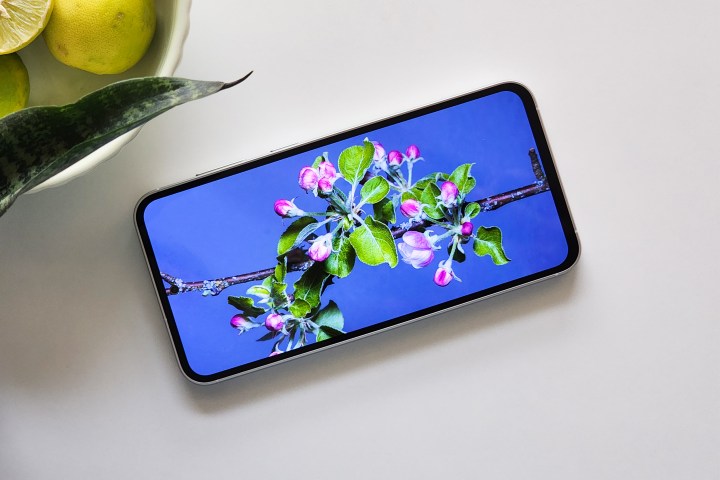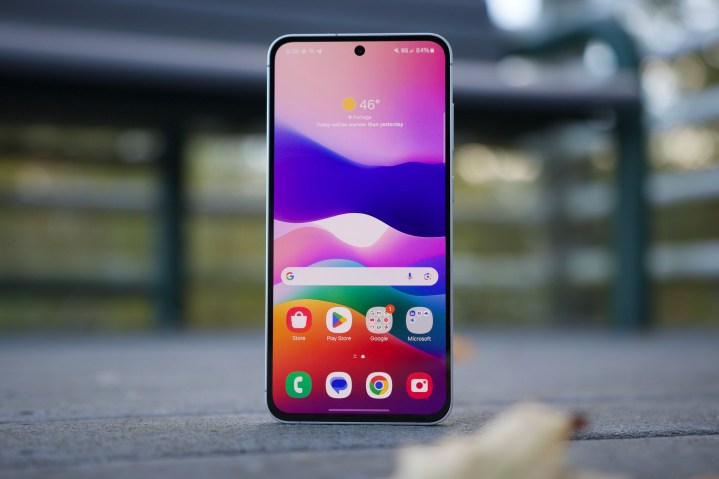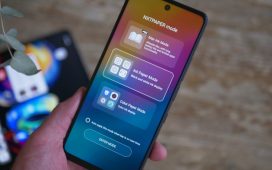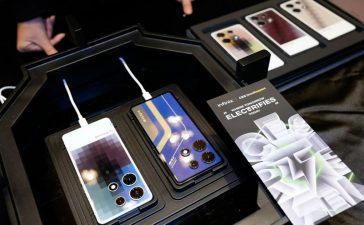Samsung’s strategy with its smartphone portfolio in 2024 has focused more on subtle hardware refinements and a deep software-level overhaul. The Samsung Galaxy S24 FE, however, is somewhat of an exception, as it supersizes the generation-over-generation upgrade formula without missing the software-side bells and whistles. With its latest Fan Edition phone, the internals aren’t serving up any unexpectedly powerful lift, and the looks haven’t changed either. But for folks who like to hold on to their phones for a healthy few years, the Galaxy S24 FE comes out swinging with some compelling benefits.
But where does it fall if you’re already using another Fan Edition? The Samsung Galaxy S23 FE remains a solid smartphone, and if you’re still using one, you may be wondering if it’s time to upgrade. If you’ve been of two minds about this, read on, as we’ve broken down the most notable differences between the Galaxy S24 FE and its predecessor.
Samsung Galaxy S24 FE vs Galaxy S23 FE: Specs
| Samsung Galaxy S24 FE | Samsung Galaxy S23 FE | |
| Dimensions and weight | 77.3 x 162.0 x 8.0 mm 213 grams |
76.5 x 158 x 8.2 mm 209 grams |
| Display | 6.7-inch FHD+ Dynamic AMOLED 2X 1080 x 2340 (FHD+) 120Hz Adaptive refresh rate (60~120Hz) Vision Booster |
6.4-inch FHD+ Dynamic AMOLED 2X Display 1080 x 2340 (FHD+) Adaptive 120Hz refresh rate (60~120Hz) |
| Processor | 10-core Exynos 2400e chipset | Eight-core Exynos 2200 Qualcomm Snapdragon 8 Gen 1 |
| Rear cameras | 12-megapixel Ultra-Wide Camera f/2.2, FOV 123 degrees 50MP Wide Camera f/1.8, FOV 84 degrees 8MP Telephoto Camera 3x Optical Zoom, f/2.4, FOV 32 degreesUHD 8K (7680 x 4320)@24fps Slow Motion 960fps @HD, 240fps @FHD |
12MP Ultra-Wide Camera f/2.2, FOV 123 degrees 50MP Wide Camera f/1.8, FOV 84 degrees 8MP Telephoto Camera 3x Optical Zoom, f/2.4, FOV 32 degrees UHD 8K (7680 x 4320)@30fps Slow Motion 240fps @FHD, 120fps @FHD, 120fps @UHD |
| Front cameras | 10MP Front Camera f/2.4, FOV 80 degrees |
10MP Front Camera f/2.4, FOV 80 degrees |
| Storage and memory | 8GB/128GB 8GB/256GB 8GB/512GB |
8GB/128GB 8GB/256GB |
| AI | Galaxy AI | Galaxy AI |
| Durability | IP68 | IP68 |
| Software and support | Android 14 (at launch) Seven Android OS upgrades promised |
Android 13 (at launch) Four Android OS upgrades promised |
| Battery and charging | 4,700mAh Wired charging: Up to 50% charge in around 30 mins with 25W Adapter Fast Wireless Charging 2.0 Wireless PowerShare |
4,500mAh Wired Charging: Up to 50% charge in around 30 mins with 25W Adapter Fast Wireless Charging Wireless PowerShare |
| Colors | Blue, Graphite, Gray, Mint, and Yellow | Mint, Cream, Graphite, Purple, Indigo and Tangerine |
| Price | Starting at $650 | Starting at $600 |
Samsung Galaxy S24 FE vs Galaxy S23 FE: looks and feel

For folks expecting something wild with the aesthetics, well, there is nothing to be excited about here. It’s the same fundamental design once again, which means a glass and metal shell with a floating lens look on the rear and a splash of fresh colors.
The most notable difference is the slightly larger display and the corresponding increase in the phone’s dimensions. Where the Galaxy S23 FE offered a 6.4-inch OLED display, its successor bumps up to 6.7 inches.
Not surprisingly, the Galaxy S24 FE is taller and wider than the Galaxy S23 FE, while also being thicker than its predecessor. Notably, the weight has only increased by about 2%, with the Galaxy S24 FE tipping the scales at a hefty 213 grams.

Those numbers don’t sound like much, but in the context of phones, they can make a tangible difference. We found it was probably on the side of too big, and while those who love big phones won’t care, those who appreciate a smaller form factor will probably find this too large.
The resolution figures remain identical at Full HD+, and so does the peak refresh rate of 120Hz. A minor difference is support for the in-house Vision Booster tech on the newer model. It is a part of the Adaptive Brightness bundle that performs tone mapping and accordingly increases the visibility in surroundings with strong illumination.
Samsung Galaxy S24 FE vs Galaxy S23 FE: internal hardware

The meatier change happens inside. The Galaxy S23 FE arrived in two variants — one with the Exynos 2200 silicon, while the U.S.-bound trim came armed with Qualcomm’s Snapdragon 8 Gen 1 system on a chip (SoC). The Galaxy S24 FE ditches the two-tier silicon formula and solely embraces the in-house Exynos 2400e processor.
The RAM and storage configurations also remain identical, with the only difference being a new 512GB storage variant for the Galaxy S24 FE. Ingress protection across both generations also remains identical at IP68.
Folks hoping for a camera upgrade are in for some disappointment as both the phones come with identical imaging hardware. The lead rear sensor is a 50-megapixel unit, sitting alongside a 12MP camera for ultrawide capture and a 10MP sensor with 3x optical zoom output.

To go with the increase in chassis size, Samsung has also fitted a larger 4,700mAh battery inside the Galaxy S24 FE. That’s a slight bump compared to the 4,500 mAh unit powering its predecessor. However, there is no upgrade in charging speeds, either wired or wireless.
Samsung Galaxy S24 FE vs Galaxy S23 FE: software and security
Software longevity and in-house security are going to be one of the biggest differentiators between the two Fan Edition phones. In fact, for anyone hoping to use their FE smartphones for the long run, it could very well be the deciding factor.
Samsung launched the Galaxy S23 FE with Android 13 underneath the OneUI skin. The company promised that it would get four Android OS upgrades, which means the phone will only get updates until Android 17, which should make its way to smartphones in 2026. The phone will get security updates for an extra year.

Samsung has since upped the ante for software longevity, not only for its flagship phones, but also for its midrange offerings. As part of that strategy, the Galaxy S24 FE arrived on the scene running Android 14 out of the box, and with a commitment of getting seven years of major Android OS upgrades.
Samsung has also promised to release security updates, at varied cadences, for an equal number of years. That means the Galaxy S24 FE should be running the latest version of Android all the way through 2030.
With the 2024 lineup of Galaxy smartphones, Samsung also made a crucial security-focused pivot. The Knox suite of security features has been a part of the Samsung device ecosystem for over a decade now, following its introduction in 2013.

Last year, Samsung introduced Knox Matrix, an interconnected security protocol that aims to use multiple connected devices in the ecosystem to protect each other. “If one element is compromised, Knox Matrix will isolate it from the ecosystem in order to protect the others,” says the company.
Knox Matrix is a cross-platform solution that enables threat analysis via a Trust Chain, and it also relies on secured credential syncing across the network. The whole system is reliant on a private blockchain to accomplish what Samsung calls intelligent threat monitoring.
This year marks the first time that Knox Matrix-compatible devices are hitting the shelf, and the Galaxy S24 FE happens to be one of them. In addition to Knox Matrix, the latest budget flagship from Samsung also serves a feature called Auto Blocker.

Offered as part of the Security and Privacy hub, it blocks the installation of apps from unauthorized sources, or in this case, the Google Play Store and the Galaxy App Store, mirroring the approach that Apple has historically followed for iPhones.
One of the biggest reasons that Android devices continue to be a hot spot of malicious activities of all kinds is the rampant distribution of apps that essentially seed malware of all varieties, paving the way for data theft and identity fraud, among other nuisances.
Going a step further, Auto Blocker also hinders command lines that are attempting to make their way in via the USB port through a compromised computer or any other device. Moreover, once the feature is enabled, it will also scan messaging apps on your phone for images that could potentially be loaded with malware.

There’s also an optional “maximum security” aspect to the Auto Blocker toolkit. Enabling it allows the system to automatically scan apps for malicious code, block activation of device administrative apps and work profiles, thwart automatic downloading of messages containing attachment files, and remove metadata such as location and date from pictures before they are shared. Finally, it also disables album sharing so that users don’t accept invites from suspicious contacts or end up sharing sensitive information.
Samsung Galaxy S24 FE vs Galaxy S23 FE: price and availability
The Samsung Galaxy S24 FE is available now, and prices start from $650. The Samsung Galaxy S23 FE is also still available, even from Samsung, but it’s only $20 less than the S24 FE, making it a bit of an odd prospect if you’re looking to immediately buy it. Expect it to get heavier discounts than its newer brethren though, especially during big sales like Black Friday.
Samsung Galaxy S24 FE vs Galaxy S23 FE: verdict
The comparison between the Galaxy S24 FE and its predecessor may not sound like much of an iterative growth, but in reality, these are fundamentally two very different phones.

The biggest difference, and one that should make a crucial difference in the day-to-day experience, is the sheer size difference. The Galaxy S24 FE falls squarely in big phone territory, while the Galaxy S23 FE is relatively compact by current industry standards.
The camera hardware is a no-upgrade situation, as is the battery. The 4nm-based Exynos 2400e sounds like a meaningful upgrade, but compared to the Galaxy S23 FE, it doesn’t offer a day-and-night difference in terms of raw performance.
Where the two phones stand miles apart is product longevity. If you’re planning to keep your phone for at least the next half-decade (against the tide of changing consumer behavior), the Galaxy S23 FE will only serve as a loyal companion through 2026, at which point, it will stop getting updates. Sure, you can keep using it after that, but it won’t get any new features or security patches.
The Galaxy S24 FE, on the other hand, is on the official Samsung support road map for the next seven years. In such a situation, a newer-generation processor only serves as an added future-proofing incentive.
For folks who are on the fence about their purchase, the Galaxy S24 FE is the obvious choice for multiple reasons, and specifically from a longevity lens. If it’s a question of upgrading between the Galaxy S23 FE and its successor, it shouldn’t be too difficult either, especially if a meaty trade-in deal is in the cards.












